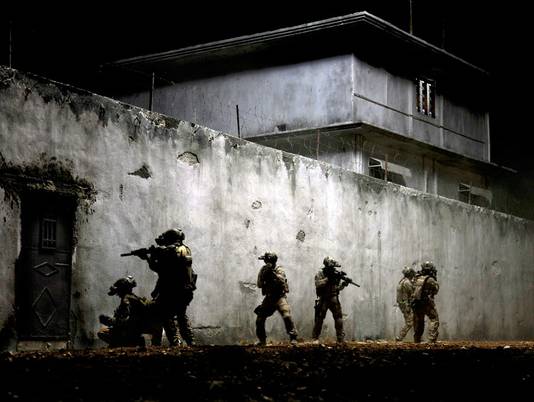Audrey Ronningen
Promotions Director
Over the course of her career, Kathryn Bigelow has made a name for herself by directing films that manage to be both action-packed and analytical. Her newest work, the skillfully executed “Zero Dark Thirty,” which went into wide release this Friday, tells the story of the C.I.A.’s search for Osama Bin Laden following the attacks on Sept. 11, 2001. What stands out about the film is its ability to make a larger statement on human motivation, and the resulting mental toll when that drive turns into obsession.
The story begins with a dark screen and recordings of phone calls of those affected by 9/11, directly in the aftermath of the attack. This opening is effective, setting up an air of urgency that is maintained throughout the rest of the film. Bigelow then flashes forward to 2003 Pakistan, where C.I.A. operatives Maya and Dan, played by Jessica Chastain and Jason Clarke, are working to gain information about ties to the Al-Qaeda leader. The film doesn’t shy away from grisly portrayals of detainee interrogation, showing upsetting sequences of torture such as waterboarding. However, a key piece of information comes from this cruel practice: the name “Abu Ahmed,” the alias for a man who worked as a courier for Bin Laden.
The film hinges on this piece of information, as Maya is adamant that finding this individual will lead to their real target. The tension builds as the main characters experience setbacks and false leads, until finally discovering “Abu Ahmed’s” true identity and tracking him to the compound where they eventually find and kill Osama Bin Laden.
From an overview, it might seem like the main point of “Zero Dark Thirty” is to tell the story of Bin Laden’s capture and death. However, the broader theme takes place at a more personal level, focusing on constant dedication to a goal, and how this mentality can affect individual well-being and morality.
This theme becomes evident through the character of Maya, who allows this mission to take over her life. Chastain does an excellent job at getting across the attitude of single-minded obsession. Although during a torture scene at the film’s exposition she is clearly uncomfortable, she also accepts it as a reality and continues. Later on, when she is “interrogating” prisoners herself, all traces of emotion have vanished, and it becomes clear that her goal of finding Bin Laden has clouded her moral stance on torture.
The character’s fixation on Bin Laden and the links to him control her every action. She is abrupt and inexpressive around others, even when she’s not on the job. In one scene another female employee reminds her, “we’re socializing; be social,” in a tone that is outwardly joking but secretly honest. The few times that in the film where Chastain’s character is genuinely happy are linked to some new information related to the mission, implying that progress is what really matters to her. Despite this, Chastain expertly avoids playing to the “tough C.I.A. agent” stereotype, and when Maya allows it—i.e., when she’s alone and not working—we’re allowed glimpses of real emotion and fear.
Although “Zero Dark Thirty” has received many positive critical reviews, it has also generated controversy, with accusations that it is “pro-torture” propaganda for the C.I.A. While the film does show graphic views of torture at the hands of U.S. agents, there is a distinct difference between depiction and endorsement. These characters are portrayed as brave and dedicated, but they can also be seen as decidedly flawed; it is precisely this arguably neurotic dedication that leads them to justify inhumane treatment of others.
“Zero Dark Thirty” takes a realistic and sometimes brutal approach to the work that went into capturing Osama Bin Laden. It is multifaceted in its plot and characters, and is just as much a psychological character study as it is an action movie. Bin Laden’s death is acknowledged as both a victory and a moral sacrifice, posing the final question to the audience: was it all worth it?

















